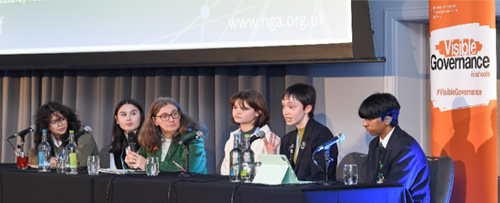What can boards do to implement Greener Governance?
Emma Knights, Co-Chief Executive, NGA

Greener Governance: leading climate action
For years, the Intergovernmental Panel on Climate Change (IPCC) and the UK's Climate Change Committee (CCC) have extensively documented the human race's impact on the planet. The IPCC, a United Nations body, assesses climate science, its implications, and mitigation options. Meanwhile, the CCC, an independent body established under the Climate Change Act 2008, advises governments on emissions targets and reports to Parliament on progress in climate change preparation.
We have a huge and growing problem. Yet despite the increased attention to the climate crisis and ramped up considerations around environmental sustainability, progress is not happening at the rate needed to avert future disasters. For the first time, global warming from pre-industrial times has exceeded temperatures of 1.5 degrees Celsius over a 12-month period.
Greener Governance webinar - 21 May 2024
Join us virtually for our webinar: 'Greener Governance: Setting a whole school approach'.
Think global; act local
The good news is there are considerable things governing boards can do. In the corporate sector there is a bit of a buzz about ESG: a focus on an organisations impact on environment, society and its governance. Progress is varied, but the emphasis is a good thing. We want ESG to be a focus in the schools and trust sector too.
Schools account for a quarter of UK public sector building emissions: tackling this will make a significant contribution to reaching Net Zero. School estates provide the opportunity to enhance biodiversity, help nature recover, as well as engaging children and young people in the natural environment. One in seventy car miles are associated with the school commute, so changing behaviours could create significant impact. Education has a critical role in preparing children and young people for a world changed by climate, equipping them with the attitude to create a sustainable future.
Developed with experts and partners, NGA promotes the 6C’s for schools and trusts tackling environmental sustainability: culture, campus, curriculum, careers, CPD and community. It is truly a whole school or trust approach which is needed and this is why those of you who govern are so important.
The board’s role
First, you simply need to get this topic on the agenda and ask is it a strategic priority for the coming year? I suggest it is better to have a sixth priority than decide the planet has to go on the backburner while you deal with more obviously urgent issues, of which we know there are many. What would your stakeholders say: have you consulted and involved pupils? Young people’s voices were very much one of the spurs to our Greener Governance campaign, and their continuing involvement is paramount.
Second, you need to identify sustainability leaders, both for the education dimensions and the business/premises aspects, ensuring they have time and resources to develop a climate action plan. This means ensuring all members of staff have the time to go on CPD relevant to their part in this work. Third, agree and monitor the plan which the Department for Education in its own sustainability and climate change strategy is expecting all schools to develop.
Making a difference
Our Greener Governance campaign began to coincide with COP26 in Glasgow in November 2021 which included the first large summit for education and environment ministers from across the globe to consider the role of education in tackling climate change.
NGA’s strapline is: “We empower those in school and trust governance with valuable resources, expert support and e-learning so that pupils can flourish”. And on environmental sustainability I hope that NGA has done just that with guidance, including questions to ask, links to resources and the DfE strategy, and case studies from those leading the way.
Others of you have yet to begin these discussions. Our latest offering is a Learning Link module which you could even consider together with senior leaders at your strategy session next term.
In our annual governance survey last May 64% of respondents reported taking action on environmental issues in their school or trust – up from 41% in 2022. But I am very much hoping that that number keeps going up. It is the role of the board to look outwards and lead change in the interests of our children and young people. NGA is here to help you do that.
Working with others
We have found that the many experts in the environmental field have given generously of their knowledge and time to work with us; and schools and trusts have reported the same locally. Do draw on all the talent and passion in your communities. Climate Ambassadors from universities across the country are also on hand to support.
Coming soon: on the morning of 14 March I am pleased to part of a panel on this very topic of climate change & sustainability convened by our partners FED (the Foundation for Education Development) for school and trust leaders. I hope you or a colleague can join us then. There will be lots of information on resources and experience from across the sector.
More details: here.

NGA’s student voice panel at our November 2022 conference. From left to right: Thiziri Boussaid (Teach the Future), Jodie Bailey-Ho (Mock-Cop), Emma Knights (NGA co-chief executive), Eliza Kinder (Hampshire UKSSN network), Honey Bradshaw (St Christopher’s C.E High School), Isaac Nawab (St Christopher’s C.E High School).

Former Chief Executive
After 14 years with NGA, Emma has departed from her role as Chief Executive. During her tenure, Emma was a strong advocate for the school governance community, engaging with legislators, policymakers, education sector organisations, and the media on a national level.